Compare Iterable vs Customer.io for email marketing, SMS, automation, and pricing. See which platform best fits your e-commerce needs in our detailed 2025 analysis.
February 12, 2025
Iterable vs Customer.io vs Maestra: Which Marketing Platform is Best for E-Commerce?
Selecting the right marketing platform is a critical decision for e-commerce marketing managers. Below, we compare Iterable, Customer.io, and Maestra.io—three prominent platforms—across essential criteria
Content:
Quick overview: Iterable vs Customer.io vs Maestra
Each platform excels in different areas, catering to specific business needs:
Iterable: Best for mid-market and enterprise teams seeking advanced multi-channel messaging and AI-driven personalization. Its strength lies in cross-channel communication (email, SMS, push, in-app), AI features like send-time optimization and brand affinity, and robust workflows. However, it often relies on third-party integrations for loyalty programs and detailed customer data management.
Customer.io: Best for small to mid-sized e-commerce businesses focusing on cost-effective email and SMS automation with strong data integration. It shines with ease of use, flexible data modeling, and ad audience sync across multiple networks. It offers unlimited data points and connected forms for lead capture. Its personalization is solid but not as advanced as Iterable’s; loyalty features require external tools or custom work.
Maestra: Best for established mid-market e-commerce brands needing a unified platform with built-in CDP, loyalty, and omnichannel capabilities. Maestra combines real-time customer data, website personalization, loyalty programs, and even ad optimization into one platform. It enables hyper-personalized flows across email, SMS, web, mobile, offline stores, and paid media. With white-glove support for all customers and no hidden fees, it’s ideal for those who want an all-in-one solution.
Comparison Summary: Iterable vs Customer.io vs Maestra
Feature
Iterable
Customer.io
Maestra
Omnichannel Automation
⭐⭐⭐⭐
Email, multi-channel orchestration, but separate loyalty/CDP
Email, multi-channel orchestration, but separate loyalty/CDP
⭐⭐⭐
Email & SMS focus; webhooks & ad sync for other channels; no native loyalty
Email & SMS focus; webhooks & ad sync for other channels; no native loyalty
🏆
⭐⭐⭐⭐⭐
Unified email, SMS, web, mobile, offline flows via built-in CDP; truly seamless omnichannel
⭐⭐⭐⭐⭐
Unified email, SMS, web, mobile, offline flows via built-in CDP; truly seamless omnichannel
Email
⭐⭐⭐⭐
Strong email campaigns; dynamic content & segmentation with AI
Strong email campaigns; dynamic content & segmentation with AI
⭐⭐⭐⭐
Great behavior-based emails; simple drag-&-drop editor; high deliverability
Great behavior-based emails; simple drag-&-drop editor; high deliverability
🏆
⭐⭐⭐⭐⭐
Proprietary drag-&-drop composer; clean code to avoid spam; advanced personalization with CDP data
⭐⭐⭐⭐⭐
Proprietary drag-&-drop composer; clean code to avoid spam; advanced personalization with CDP data
SMS & Push
⭐⭐⭐⭐
Native SMS; mobile push via SDK; in-app messaging supported
Native SMS; mobile push via SDK; in-app messaging supported
⭐⭐⭐
Native SMS included; push via SDK/webhooks; limited in-app
Native SMS included; push via SDK/webhooks; limited in-app
🏆
⭐⭐⭐⭐⭐
Integrated SMS in omnichannel flows; web & mobile push with rich media, A/B testing
⭐⭐⭐⭐⭐
Integrated SMS in omnichannel flows; web & mobile push with rich media, A/B testing
Loyalty Features
⭐⭐
No built-in loyalty; relies on integrations like Zinrelo or Talon.One
No built-in loyalty; relies on integrations like Zinrelo or Talon.One
⭐⭐
No native loyalty program; can trigger points/rewards via API or integrations
No native loyalty program; can trigger points/rewards via API or integrations
🏆
⭐⭐⭐⭐⭐
Full loyalty suite: points, tiers, referrals, promotions based on real-time behavior
⭐⭐⭐⭐⭐
Full loyalty suite: points, tiers, referrals, promotions based on real-time behavior
Lead Generation
⭐⭐⭐
Sign-up forms & landing pages via integrations; basic pop-ups possible
Sign-up forms & landing pages via integrations; basic pop-ups possible
⭐⭐⭐⭐
Connected Forms auto-add leads; supports pop-ups via webhooks; good form capture
Connected Forms auto-add leads; supports pop-ups via webhooks; good form capture
🏆
⭐⭐⭐⭐⭐
Built-in pop-ups, embedded forms, surveys, quizzes with fine control; avoids over-soliciting
⭐⭐⭐⭐⭐
Built-in pop-ups, embedded forms, surveys, quizzes with fine control; avoids over-soliciting
User-Generated Content
⭐⭐⭐
No direct UGC tools; can incentivize reviews via emails/SMS; needs Yotpo or similar for UGC management
No direct UGC tools; can incentivize reviews via emails/SMS; needs Yotpo or similar for UGC management
⭐⭐
No direct UGC tools; can reward actions via API or integrate with review apps
No direct UGC tools; can reward actions via API or integrate with review apps
⭐⭐⭐
No built-in UGC management; rewards for reviews & shares via loyalty points; surveys for feedback
No built-in UGC management; rewards for reviews & shares via loyalty points; surveys for feedback
Customer Data Management
⭐⭐⭐⭐
Iterable Catalog & profiles allow rich data; no native full CDP, but strong data integration
Iterable Catalog & profiles allow rich data; no native full CDP, but strong data integration
⭐⭐⭐⭐
Data-first approach with unlimited attributes/events; no extra fees for data; can integrate a CDP
Data-first approach with unlimited attributes/events; no extra fees for data; can integrate a CDP
🏆
⭐⭐⭐⭐⭐
Real-time CDP included; unified profiles from online/offline sources; single source of truth for all channels
⭐⭐⭐⭐⭐
Real-time CDP included; unified profiles from online/offline sources; single source of truth for all channels
User Segmentation
⭐⭐⭐⭐
Deep segmentation by behavior & custom events; AI-driven scoring
Deep segmentation by behavior & custom events; AI-driven scoring
⭐⭐⭐
Good segmentation by traits & actions; can use custom objects; not real-time
Good segmentation by traits & actions; can use custom objects; not real-time
🏆
⭐⭐⭐⭐⭐
Real-time & RFM segmentation; segment by product interactions, lifecycle stage; nested & computed fields for precision
⭐⭐⭐⭐⭐
Real-time & RFM segmentation; segment by product interactions, lifecycle stage; nested & computed fields for precision
Recommendations (Email/Web)
⭐⭐⭐
Supports personalized content via Catalog; can recommend products with logic, but may need dev setup
Supports personalized content via Catalog; can recommend products with logic, but may need dev setup
⭐⭐
No native recommendations engine; requires external AI or manual curation
No native recommendations engine; requires external AI or manual curation
🏆
⭐⭐⭐⭐⭐
AI-powered product recommendations on site & email; +14 algorithms or custom rules; real-time updates
⭐⭐⭐⭐⭐
AI-powered product recommendations on site & email; +14 algorithms or custom rules; real-time updates
Ad Audience Sync
⭐⭐
Limited native ad sync; offers Facebook Custom Audiences integration; other ad platforms via APIs/Zapier
Limited native ad sync; offers Facebook Custom Audiences integration; other ad platforms via APIs/Zapier
🏆
⭐⭐⭐⭐⭐
Multi-platform ad sync (Google, FB/IG, YouTube) from segments; auto-updates audiences to save ad spend
⭐⭐⭐⭐⭐
Multi-platform ad sync (Google, FB/IG, YouTube) from segments; auto-updates audiences to save ad spend
🏆
⭐⭐⭐⭐⭐
Automated ad segmentation and sync to Google, FB/IG; uses precise segments to reduce CPA and improve ROAS
⭐⭐⭐⭐⭐
Automated ad segmentation and sync to Google, FB/IG; uses precise segments to reduce CPA and improve ROAS
Analytics & Reporting
⭐⭐⭐⭐
Rich campaign analytics, cohort analysis, A/B testing, and custom dashboards via Insights
Rich campaign analytics, cohort analysis, A/B testing, and custom dashboards via Insights
⭐⭐⭐
Good basic reporting for emails, SMS, and conversions; can export data; needs external BI for deep insights
Good basic reporting for emails, SMS, and conversions; can export data; needs external BI for deep insights
🏆
⭐⭐⭐⭐⭐
Advanced analytics dashboards for loyalty, campaigns, revenue goals, email health, etc.; A/B testing with control groups; export any data anytime
⭐⭐⭐⭐⭐
Advanced analytics dashboards for loyalty, campaigns, revenue goals, email health, etc.; A/B testing with control groups; export any data anytime
Customer Support
⭐⭐⭐
Email & chat support; premium support or dedicated CSM at higher tiers; strong documentation/community
Email & chat support; premium support or dedicated CSM at higher tiers; strong documentation/community
⭐⭐⭐⭐
Email support for all; faster chat support on Premium; 99% CSAT; active community
Email support for all; faster chat support on Premium; 99% CSAT; active community
🏆
⭐⭐⭐⭐⭐
White-glove service for all plans: every client gets a dedicated success manager, <5 min chat responses, help with onboarding, migration, strategy
⭐⭐⭐⭐⭐
White-glove service for all plans: every client gets a dedicated success manager, <5 min chat responses, help with onboarding, migration, strategy
Pricing
💲💲💲
No public pricing; known for premium cost plus potential add-on fees for API calls, storage, etc. Iterable targets mid-large enterprises.
No public pricing; known for premium cost plus potential add-on fees for API calls, storage, etc. Iterable targets mid-large enterprises.
💲💲
Transparent tiers: Essentials ~$100/mo for 5k profiles; Premium ~$1k/mo for more profiles and support. 14-day trial available.
Transparent tiers: Essentials ~$100/mo for 5k profiles; Premium ~$1k/mo for more profiles and support. 14-day trial available.
💲💲💲
Starts ~$1,990/mo for up to 80k profiles. All features included at any scale: unlimited emails, full platform access, and dedicated CSM. No hidden fees.
Starts ~$1,990/mo for up to 80k profiles. All features included at any scale: unlimited emails, full platform access, and dedicated CSM. No hidden fees.
Best For
Mid-market to enterprise e-commerce teams wanting sophisticated cross-channel marketing and can invest in integration and setup efforts.
Small to mid-sized e-commerce and startups that need affordable multi-channel basics (email, SMS, simple push) with strong data integration and are willing to use add-ons for loyalty/UGC.
Mid-market e-commerce with an established team and steady traffic, seeking a unified growth platform for hyper-personalized omnichannel campaigns and loyalty without adding multiple tools.
Omnichannel Marketing Automation
Maestra: Сreates seamless omnichannel flows that integrate email, SMS, web, mobile app, offline, and ad channels. Maestra’s built-in CDP lets all channels react to real-time customer behavior, ensuring consistent messaging everywhere. For example, a single Maestra workflow could send an email, follow up with an SMS, show a website pop-up, and trigger a Facebook ad—all tailored to a customer’s actions. Businesses have run dozens of simultaneous flows in Maestra without performance issues.
Iterable: A close second. Iterable is a cross-channel platform supporting email, SMS, push (mobile & web), in-app messages, and even direct mail within one workflow. Marketers can design complex visual workflows with branching, delays, and triggers based on user behavior. However, Iterable lacks a native loyalty module or integrated CDP, so truly unified data across channels requires extra effort or integrations.
Customer.io: Supports multi-channel messaging but on a smaller scale. Out-of-the-box, it handles email and SMS very well, and offers push notifications via mobile SDKs. You can also trigger webhooks to connect with other services—for instance, sending data to a separate push platform or loyalty app. Ad audience sync is a standout: Customer.io can automatically turn any segment into an ad audience on platforms like Google, Facebook, and Instagram. This means you can orchestrate an email->social ad->SMS sequence, though it’s not as visually unified as Iterable’s or Maestra’s approach.
Email Marketing
All three platforms handle email marketing, but the depth varies:
Iterable: Offers robust email campaign tools, scoring 9.2/10 in user ratings for Email Campaigns. It features a drag-and-drop email builder and dynamic content insertion for personalization. Iterable also provides AI optimizations like Send Time Optimization to send emails at the ideal time for each user, and Brand Affinity modeling to tailor content tone/frequency. It’s built for scale, sending billions of messages annually. If your focus is sophisticated email with deep segmentation and big volumes, Iterable excels.
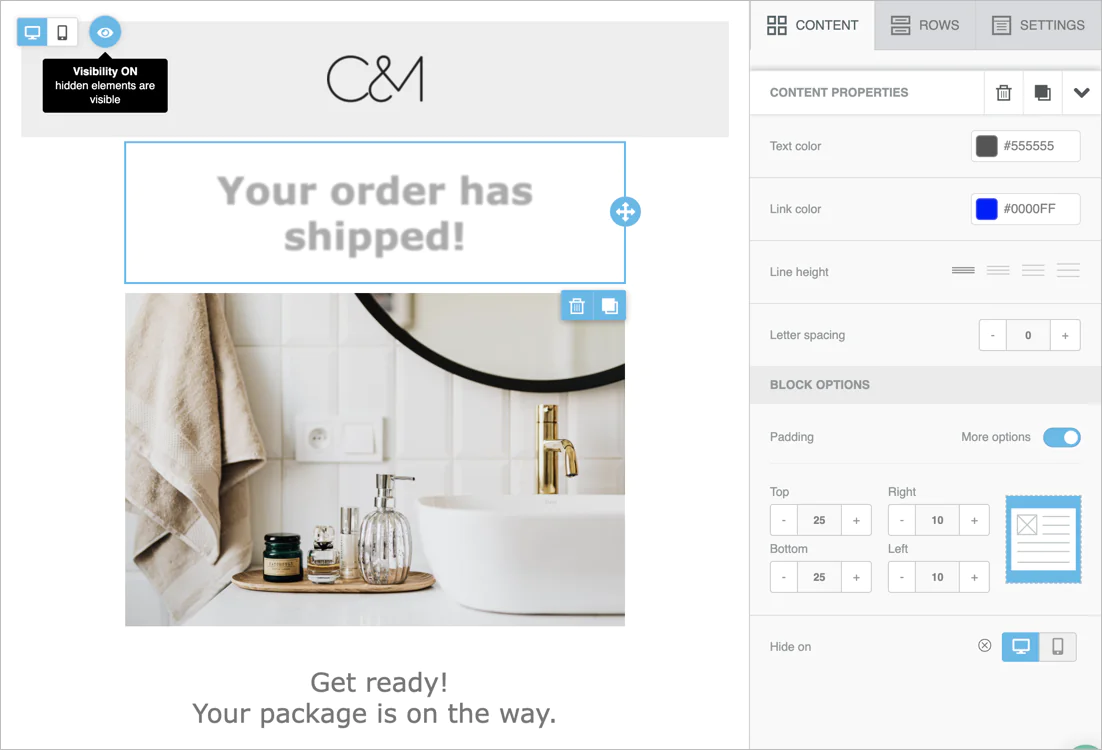
Iterable’s visual composer
Customer.io: Known for behavior-triggered emails (e.g., welcome series, abandoned cart) and has a user-friendly campaign builder. It actually scores slightly higher (9.6/10) than Iterable in G2 for Email Marketing, likely due to ease-of-use for basic campaigns. You can run newsletters, drip campaigns, and transactional emails through one platform. Customer.io’s niche is making it easy to send the right email when a user does X (like views a product or hits a certain loyalty point). It’s great for SMBs that need reliable, automated email without too much complexity.
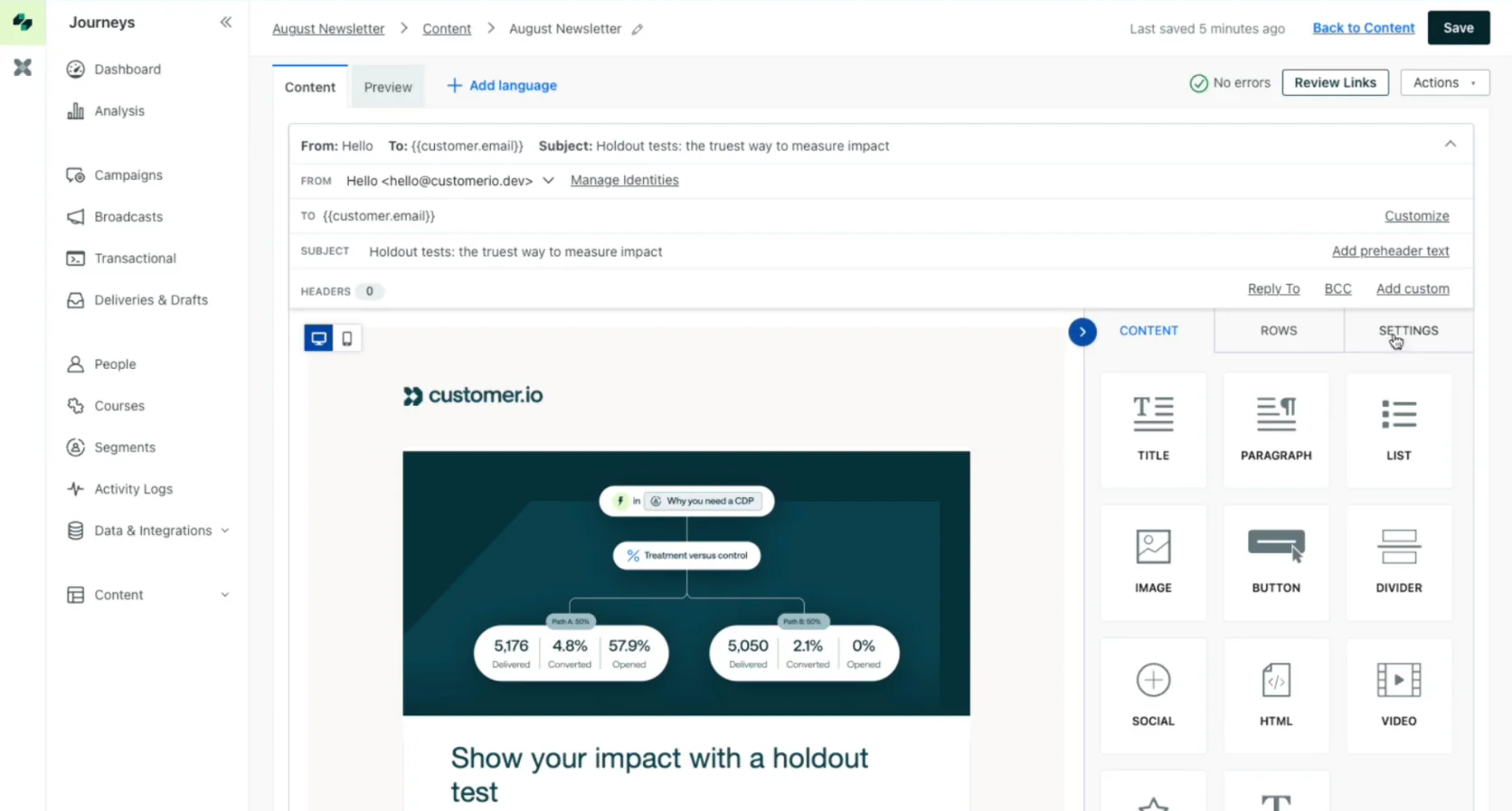
Customer.io’s visual email composer
Maestra: Takes email further by leveraging its CDP. Its email editor ensures clean code (no extra bloat), helping avoid spam filters. You get advanced features like AMP for Email, A/B testing, UTM tracking, and dynamic content blocks that auto-populate based on customer segment data. Because Maestra knows so much about each customer (from purchase history to site behavior), you can personalize emails heavily—e.g., product recommendations or unique offers right in the email for each recipient. It even boasts high sending capacity (up to 500k emails/hour) for growing brands.
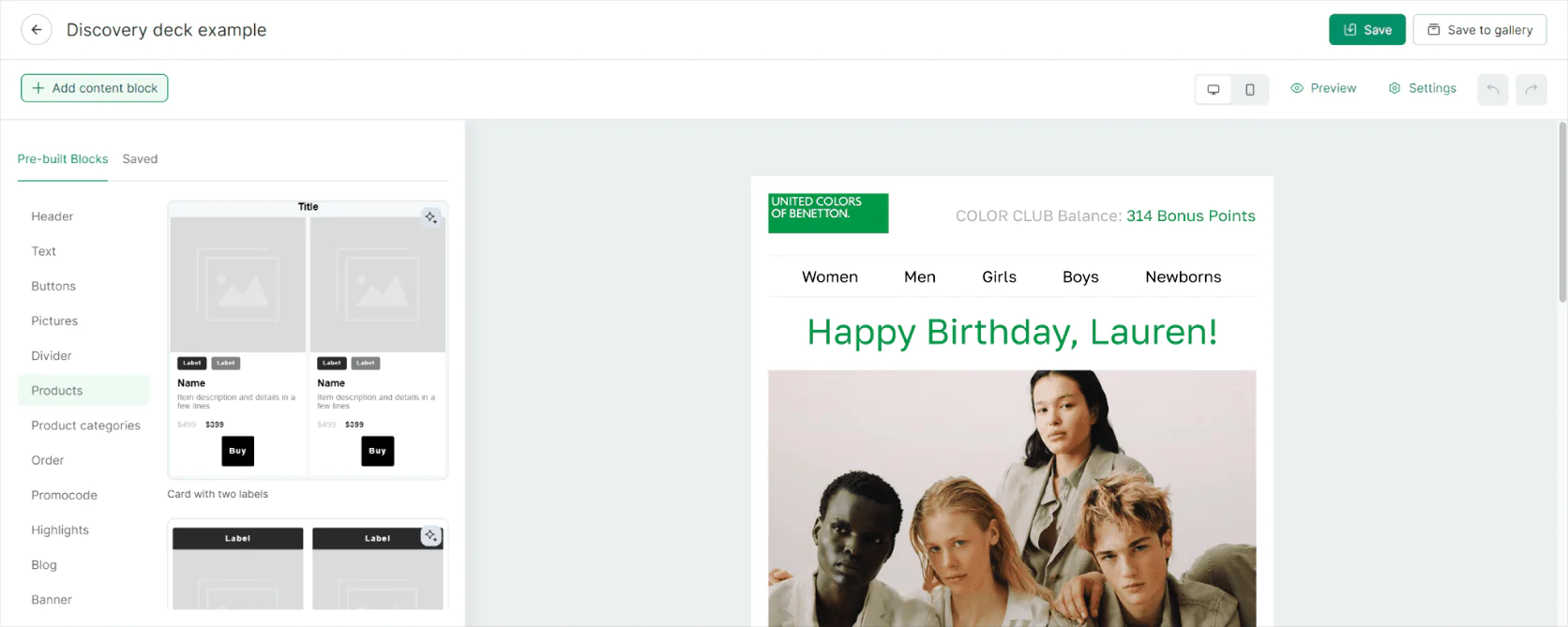
Maestra’s visual email composer
Takeaway: Customer.io is great for straightforward, trigger-based emails, Iterable adds AI and enterprise muscle for massive or very nuanced email programs, and Maestra provides hyper-personalization by tapping into unified data and advanced automation in its emails.
SMS and Push Notifications
Iterable: Natively supports SMS and both mobile push and web push notifications. You can include SMS as steps in the workflow—for example, follow up an email with an SMS reminder if no click.
Iterable’s push notifications (via its mobile SDK) allow images and action buttons, much like any leading push provider. It also has in-app messaging for when users are actively in your mobile app. All these channels are coordinated in Iterable’s journey builder, though be mindful of costs—certain channels or high usage might incur add-on fees.
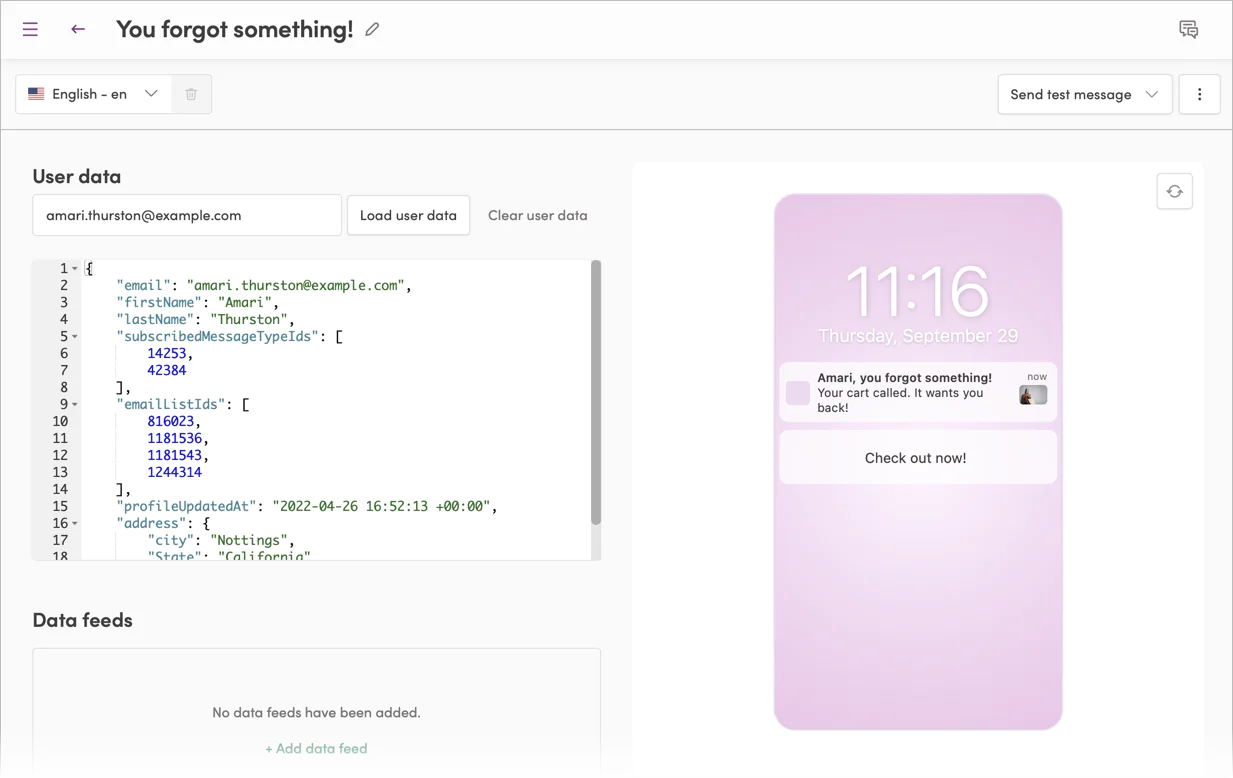
Iterable: сreating push notification template
Customer.io: SMS messaging is included in Customer.io’s multi-channel mix from the Essentials plan up. It’s quite capable for sending personalized texts (e.g., “Hey John, the item in your cart is almost sold out!”).
Push notifications are supported via a mobile SDK (for iOS/Android apps) and can be triggered in campaigns.
Notably, web push isn’t a built-in one-click feature; you might implement web push by using Customer.io’s webhook to connect to another service. For many e-commerce brands (especially those on Shopify or similar), Customer.io’s SMS is sufficient, and push is feasible if you have a mobile app.
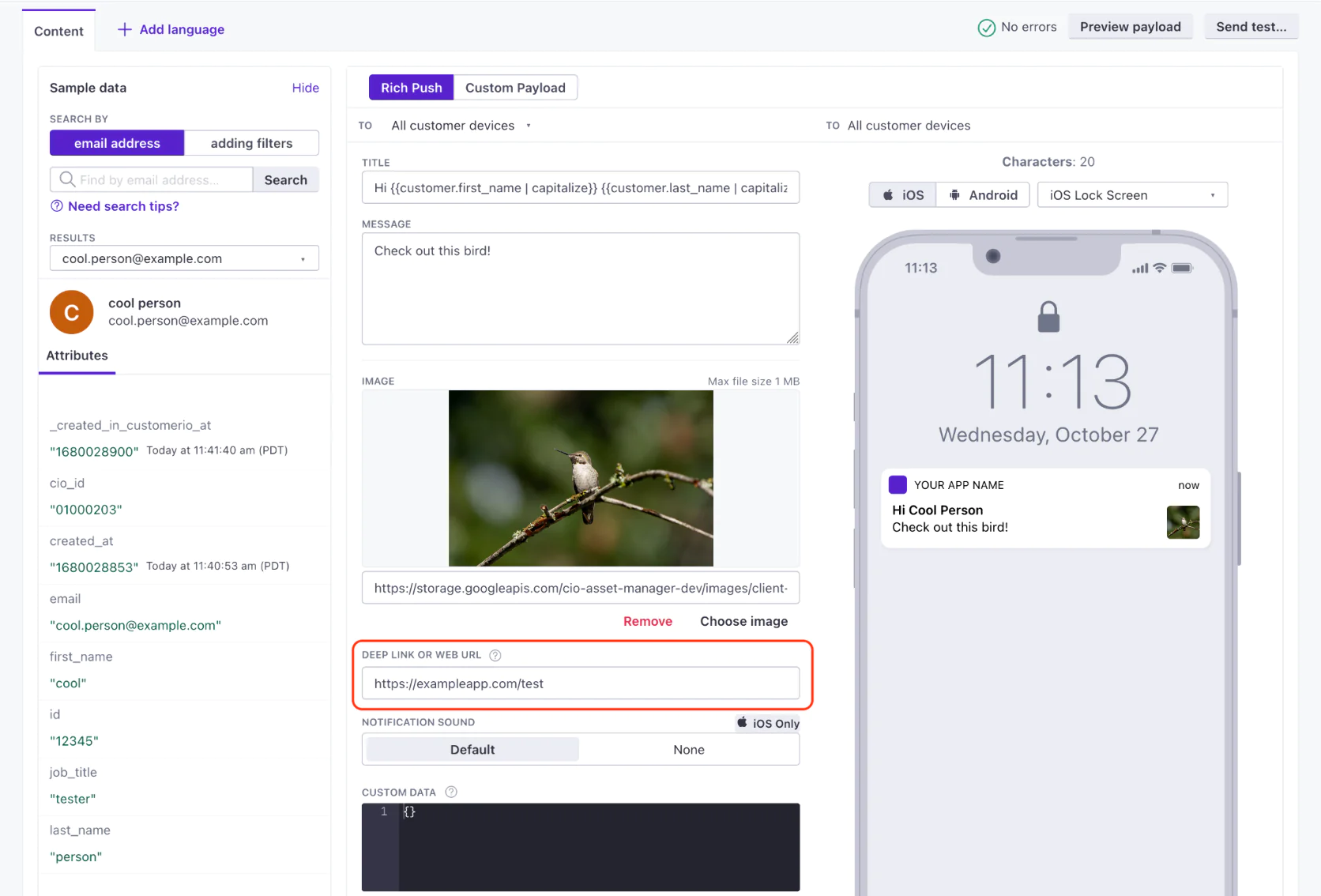
Customer.io: сreating push notification template
Maestra: Excels with cross-device messaging. SMS in Maestra is part of the omnichannel flow, meaning it can smartly coordinate with other messages (no silo). Maestra supports bulk SMS campaigns with high-speed sends and features like short links and A/B testing for SMS to optimize content. For push notifications, Maestra stands out by offering both web and mobile push out-of-the-box. You can design push campaigns with rich media (images, buttons) and target by device type or behavior. For example, send a mobile app push about loyalty points, and a web push for price drops—all managed in one place. If a user opts out of push, Maestra can pivot to another channel, maintaining the conversation seamlessly.
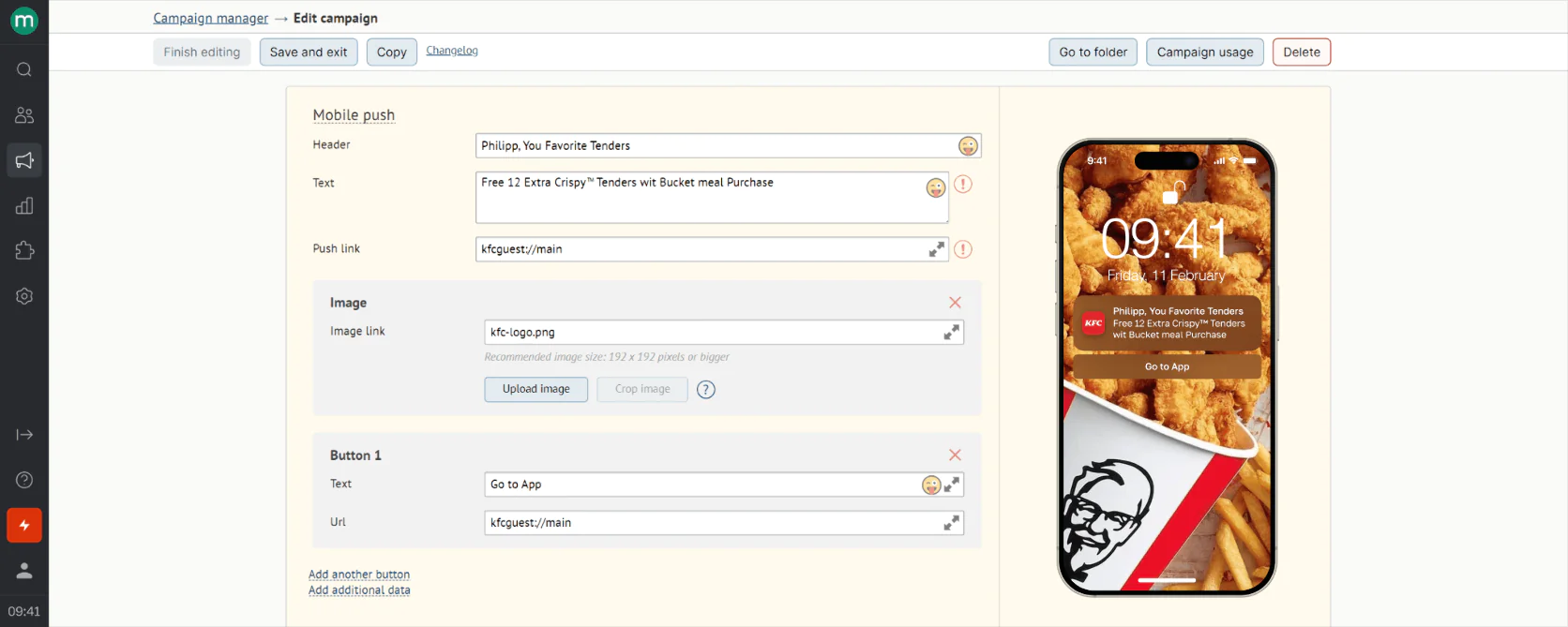
Maestra: сreating push notification template
Takeaway: If SMS is key, all three do it well. Iterable and Maestra offer more integrated push support (Iterable for app developers, Maestra for a unified approach). Customer.io covers SMS thoroughly and can do push with some setup. For a true all-in-one handling of SMS/push with your other channels, Maestra has a slight edge due to fluid integration in campaigns.
Loyalty Program Features
Loyalty programs drive repeat business, and here the differences are stark:
Iterable: No built-in loyalty module. Brands use Iterable for messaging around loyalty (like sending points balance emails or reward expiring SMS), but the loyalty system itself must come from elsewhere. Iterable integrates with loyalty tools like Zinrelo or Talon.One—e.g., if using Zinrelo, a new points transaction triggers a sync to Iterable so you can message that user. This works, but it’s not seamless.
Customer.io: Also lacks a native loyalty program feature. You can hack something by using Custom API calls or webhooks to adjust points in an external system and then message the user. For instance, some brands connect Customer.io with referral program APIs to grant points for referrals. But out-of-the-box, Customer.io doesn’t manage points, tiers, or rewards.
Maestra: Fully featured loyalty and promotions are built-in. You can create points programs, VIP tiers, referrals, and time-bound promotions natively. What’s powerful is Maestra ties loyalty events into its CDP: you can trigger flows when a customer reaches a tier or offer dynamic rewards based on behavior (e.g., give extra points if a high-value customer’s purchase is slipping).
Maestra allows highly flexible promotions—e.g., “double points on category X this week for VIPs in New York”—and ensures those promotions show up across channels (site banner, email, SMS) consistently. Neither Iterable nor Customer.io can do that without substantial custom integration.
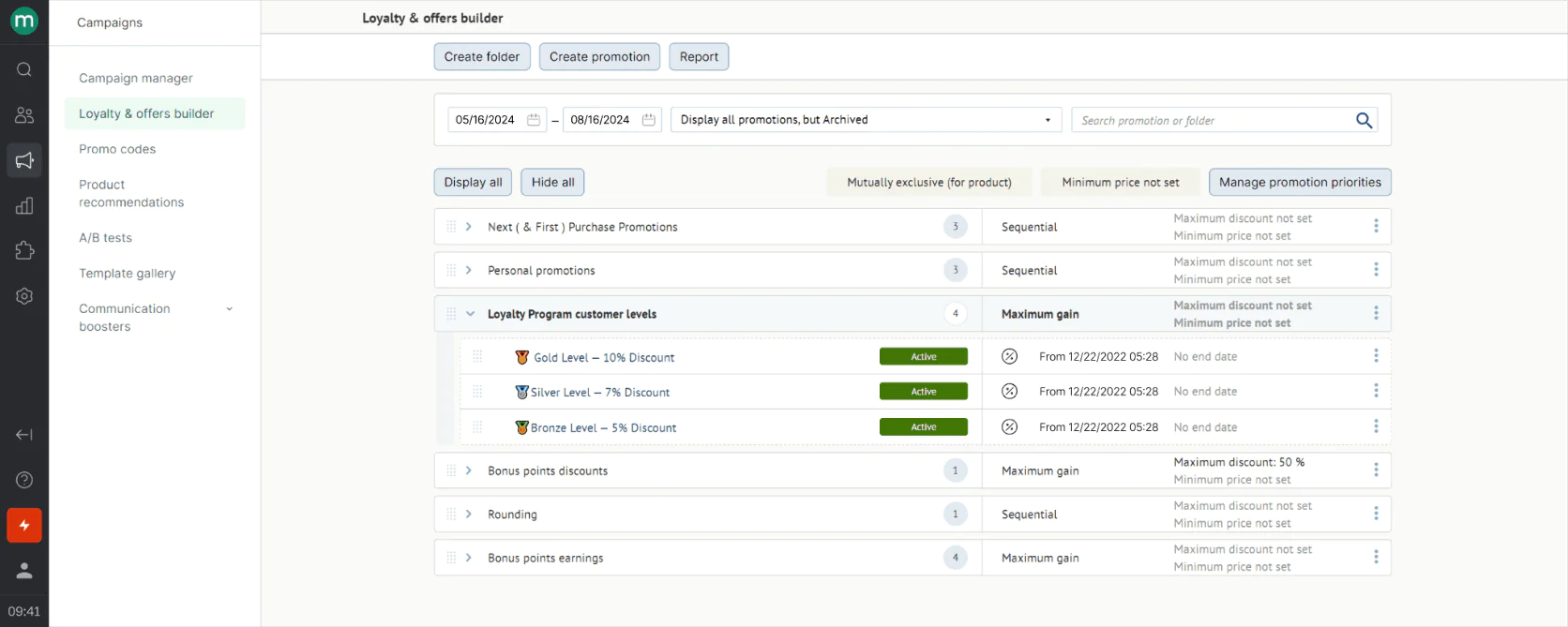
Maestra’s promotions rule engine
Takeaway: If you already have or don’t need a loyalty program, Iterable/Customer.io are fine. If you do want integrated loyalty/rewards, Maestra clearly wins—it’s ready out-of-the-box to handle points and rewards and link them to your marketing.
Lead Generation Tools
Iterable: Doesn’t provide form builders or pop-up tools itself. Brands typically use their e-commerce platform forms or integrate third-party lead capture (like Sumo, Justuno, etc.) and then pass data into Iterable via API.
Customer.io: Introduced Connected Forms—a feature to connect your website’s existing forms directly to Customer.io. This means if someone fills out a newsletter sign-up on your site, Customer.io can capture that without extra coding (it scans for form submissions). It’s quite handy for automating welcome sequences.
However, Customer.io doesn’t have a built-in pop-up designer. You might still use another tool to design the popup.
Maestra: Offers robust lead capture widgets: easily customizable pop-ups, embedded signup forms, surveys, quizzes, and even gamified spin-to-win modals. You can design these in Maestra to match your site. Critically, Maestra’s pop-ups tie into its user profiles, so you can show different offers based on segment (e.g., new vs. returning visitor). It also has controls to avoid spamming users with too many pop-ups by setting frequency rules. Additionally, Maestra can capture zero-party data (preferences directly from customers via quizzes) and immediately use that data in segmentation.
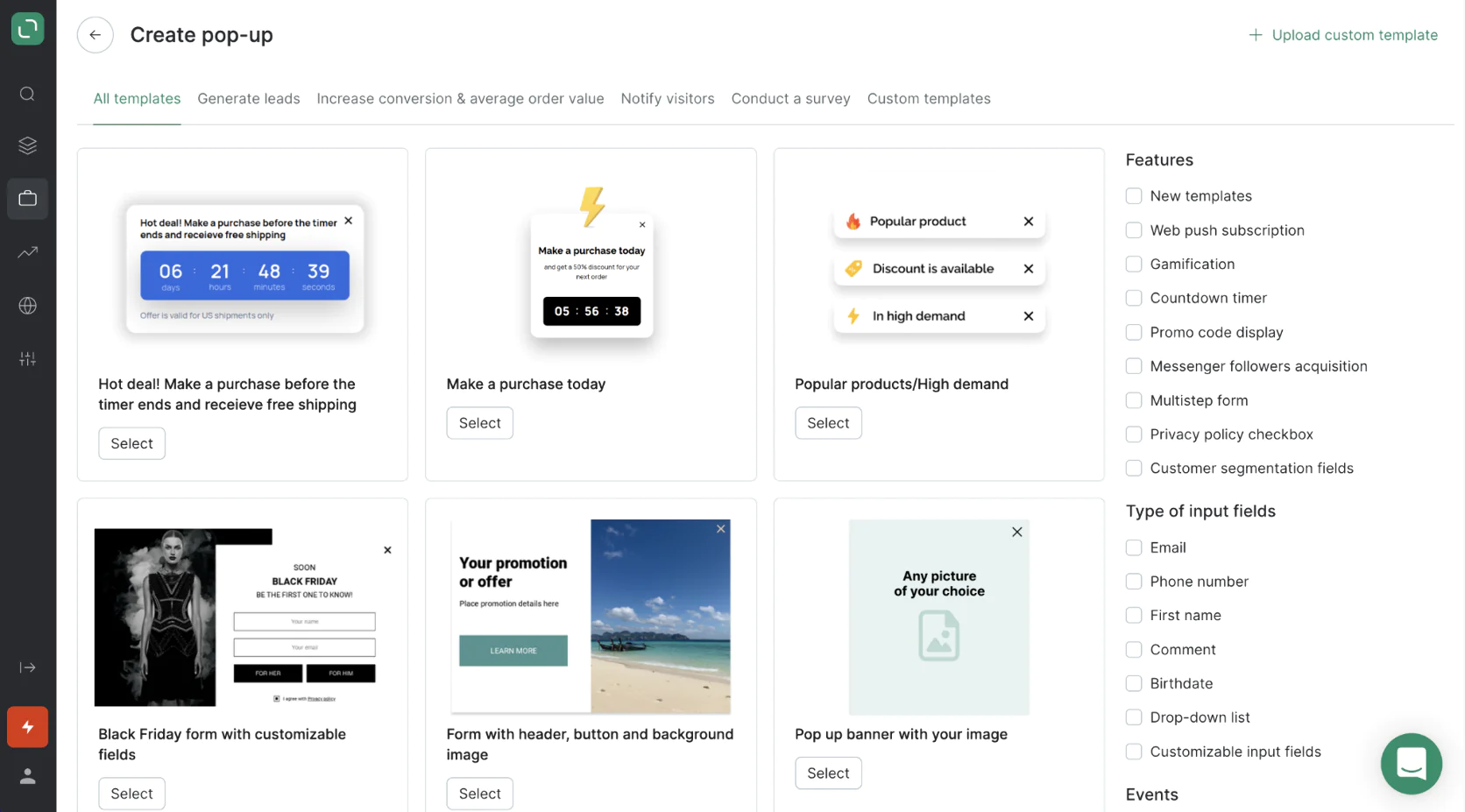
Maestra’s pop-up form templates
Takeaway: Maestra gives you an all-in-one solution for capturing leads on your site with no extra tools required, which is great for rapid deployment. Customer.io simplifies connecting forms, which is useful if you have existing forms or landing pages. Iterable is more dependent on external lead capture methods, focusing instead on what you do once the lead is in the system.
User-Generated Content (UGC) and Reviews
Iterable: No native UGC management, but you can incorporate UGC into communications. For example, if you use Yotpo or another reviews app, you could sync high-rating customers into Iterable segments or pull in a review snippet into an email via API.
Customer.io: Similar story—it’s a messaging platform. It doesn’t host product reviews or collect user photos. You can incentivize UGC indirectly (e.g., send an email asking for a review with a coupon reward). If someone shares content, you could use the API to tag them. But features like showing Instagram galleries or filtering reviews are not in Customer.io.
Maestra: Does not manage UGC content on-site either (it’s not a reviews platform). However, Maestra incentivizes UGC as part of its loyalty engine. You can set up campaigns like “After purchase, send an email/SMS asking for a review; if they complete it, reward them with loyalty points or a promo code.” Maestra even offers post-purchase surveys to gauge satisfaction, then targets happy customers to leave public reviews on platforms like Trustpilot. It’s a strategy to increase UGC indirectly.
Takeaway: For UGC management and display, you’ll need a dedicated solution (often the e-commerce platform or a Yotpo-like service). Among our three, Yotpo (a separate product) was mentioned as a UGC leader. In context, Iterable and Customer.io can incorporate UGC data into messaging, but only Maestra ties it into loyalty incentives natively. If UGC is a huge part of your strategy, you might lean towards a combo like Customer.io + Yotpo, or Iterable + Yotpo. If it’s moderate and you just want to encourage reviews, Maestra’s built-in incentives could suffice.
Customer Data Management (CDP) and Personalization
Maestra: Maestra was built as a real-time CDP from day one. It unifies customer profiles across online and offline data sources, deduplicating and updating in real-time. For an e-commerce brand, this means Maestra can ingest data from your store, website, mobile app, email clicks, in-store POS, etc., and create one master profile per customer. All of Maestra’s features (email, SMS, loyalty, site personalization, ads) tap into this rich profile, allowing advanced personalization and preventing conflicting messages. For example, if a customer just redeemed a loyalty reward in store, Maestra could instantly stop an email campaign offering that reward online—because its CDP knows it’s used. This level of real-time unified data is unmatched by Iterable or Customer.io without additional tools.
Iterable: While not a CDP, Iterable has Iterable Catalog and can store a lot of data per user (demographics, events, custom fields). It also integrates with third-party CDPs and data warehouses. Iterable’s platform is built to be data-flexible: you can ingest behavioral events (like “Viewed Category: Shoes”), use that in segmentation, and even do some predictive stuff (Brand Affinity, etc.). However, Iterable imposes limits on event storage for certain plans and doesn’t have custom objects (until recently). It’s more of a marketing execution platform than a single source of truth. Many Iterable users pipe data from an existing CDP or use reverse ETL from their warehouse to fuel it.
Customer.io: Takes a “data first” approach, advertising unlimited data points, events, and attributes on all plans. Essentially, they don’t nickel-and-dime you for storing customer data. You can also define custom objects (like an “Order” object linked to people) to use in campaigns. Customer.io can act like a lightweight CDP—it doesn’t automatically unify identities across devices, but if you identify users properly, it holds everything. They also have Data Pipelines for moving data in/out, so it plays nicely if you have a separate CDP or warehouse.
Personalization capabilities flow from data. Iterable and Maestra both allow advanced segmentation (Iterable’s is batch/trigger-based; Maestra’s can be real-time). Maestra can do things like RFM (Recency, Frequency, Monetary) scoring automatically, which is very marketing-oriented. Iterable might require you to compute that externally and import a score (or use their AI features differently). Customer.io allows complex segment rules and recently added real-time segment updates, but not at the depth of RFM analysis unless you do manual work.
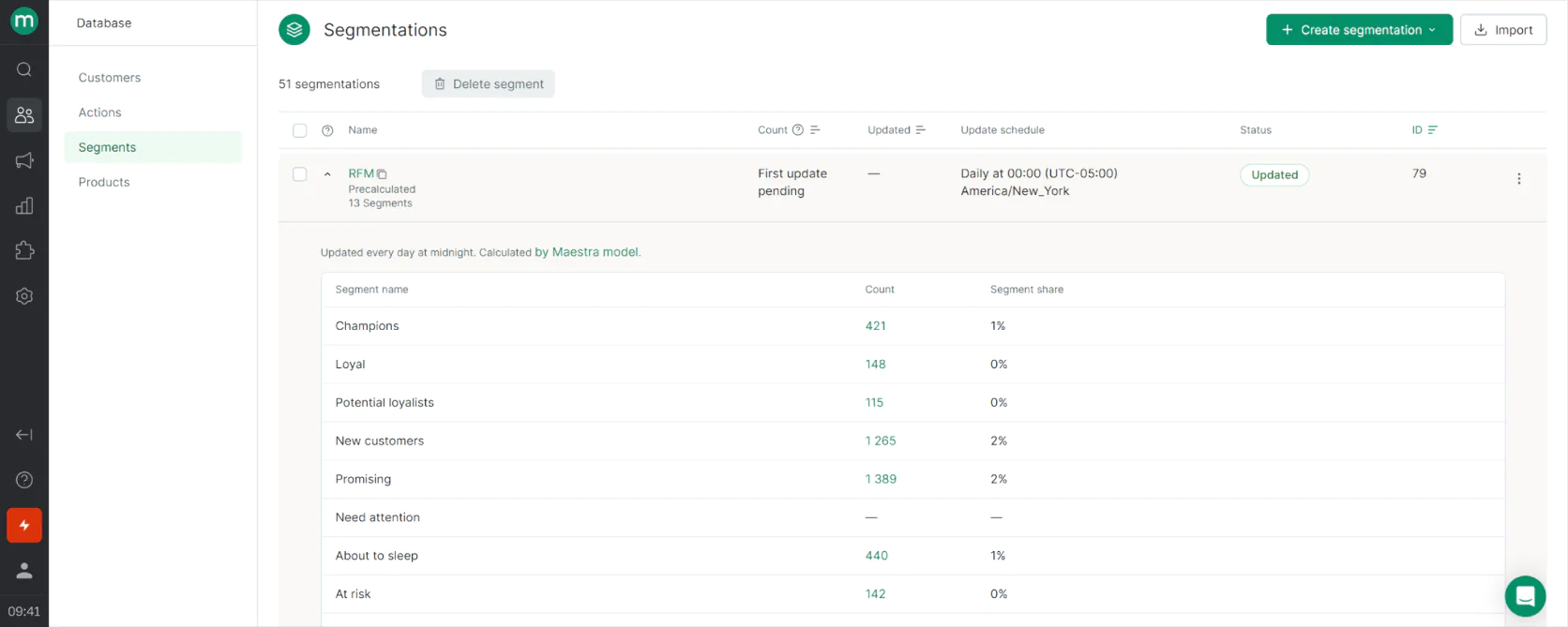
Maestra’s automated RFM segmentation
Takeaway: If you lack a CDP and want one integrated, Maestra is the clear winner. If you have a decent data setup or smaller scale, Customer.io gives you plenty of data flexibility for the price. Iterable is powerful but might incur extra costs for huge datasets, and it often coexists with a separate CDP in enterprise stacks.
User Segmentation
Iterable: Highly rated for segmentation (9.1/10 on G2). You can segment users based on profile fields, event triggers, message interactions, etc. Iterable’s segmentation can be dynamic (“any user who did X in last 30 days”) and these can fuel campaigns. Iterable also offers Audience Syndication where segments can sync to Facebook or Google (though more limited natively than Customer.io’s multi-ad sync). Iterable recently introduced a feature akin to computed traits or custom events that help with segmentation. Overall, it’s great for behavioral segments (e.g., cart abandoners, lapsed buyers) especially when combined with its AI scoring (to find likely buyers, etc.).
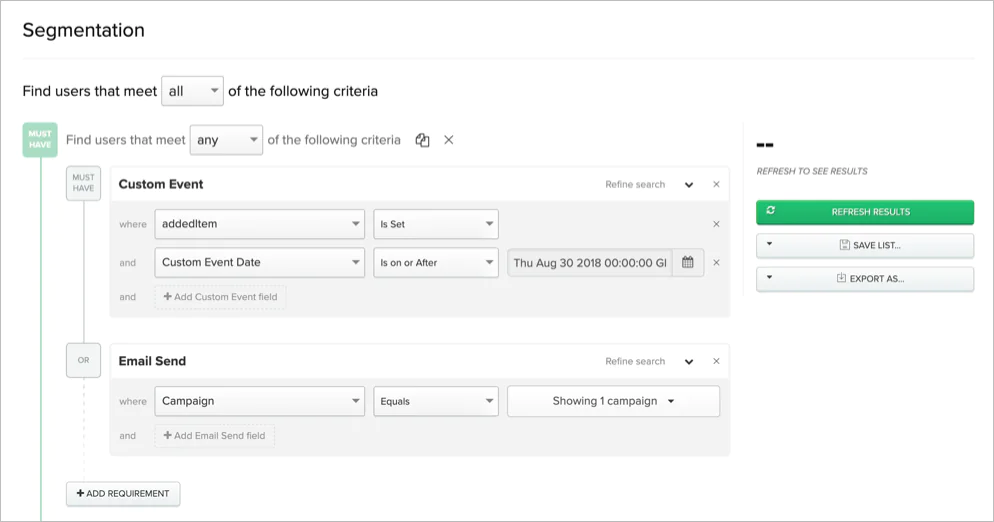
Iterable: user segmentation
Customer.io: Allows you to create segments based on any data attribute or event in the system. It’s quite flexible: for example, “has placed >3 orders AND hasn’t bought in 6 months”. These segments update continuously or can be snapshot-based. Customer.io also supports segment-triggered workflows, meaning if someone enters a segment, it can start a campaign.
One limitation is if you need very advanced logic (like “people who bought shoes OR shirts but not pants AND have opened 5 emails”) it can get tricky, but mostly it’s sufficient. They also have a notion of “Data-driven segments” which can update in real time as events stream in.
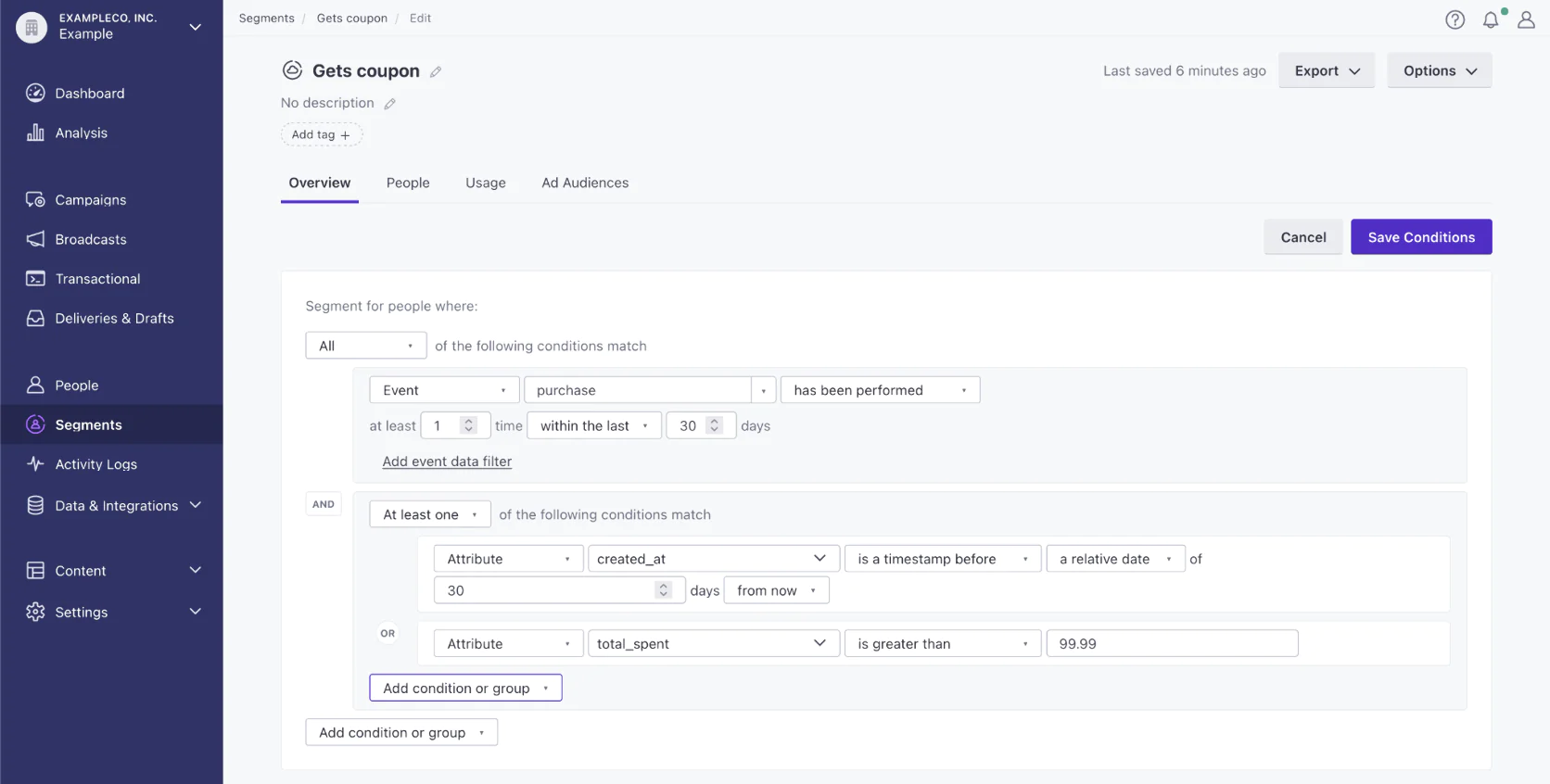
Customer.io: user segmentation
Maestra: Brings segmentation to another level with its CDP. It offers real-time segments, scheduled (batch) segments, and static lists. You can segment on virtually anything: past purchases, on-site behaviors, email engagement, loyalty status, location, etc., in combination. Two standout capabilities: Product-based segmentation (group users by what products or categories they interact with), and RFM segmentation which automatically groups customers into personas like “Champions, Loyal, At-Risk, Dormant” based on purchase recency/frequency/value. This is extremely useful for lifecycle marketing—e.g., automatically target “At-Risk” customers with win-back offers. Maestra even allows nested segments and exclusions for precision (e.g., segment of “all electronics shoppers” minus “VIPs”), and computed fields on profiles (like storing each user’s most browsed category) for segmentation logic.
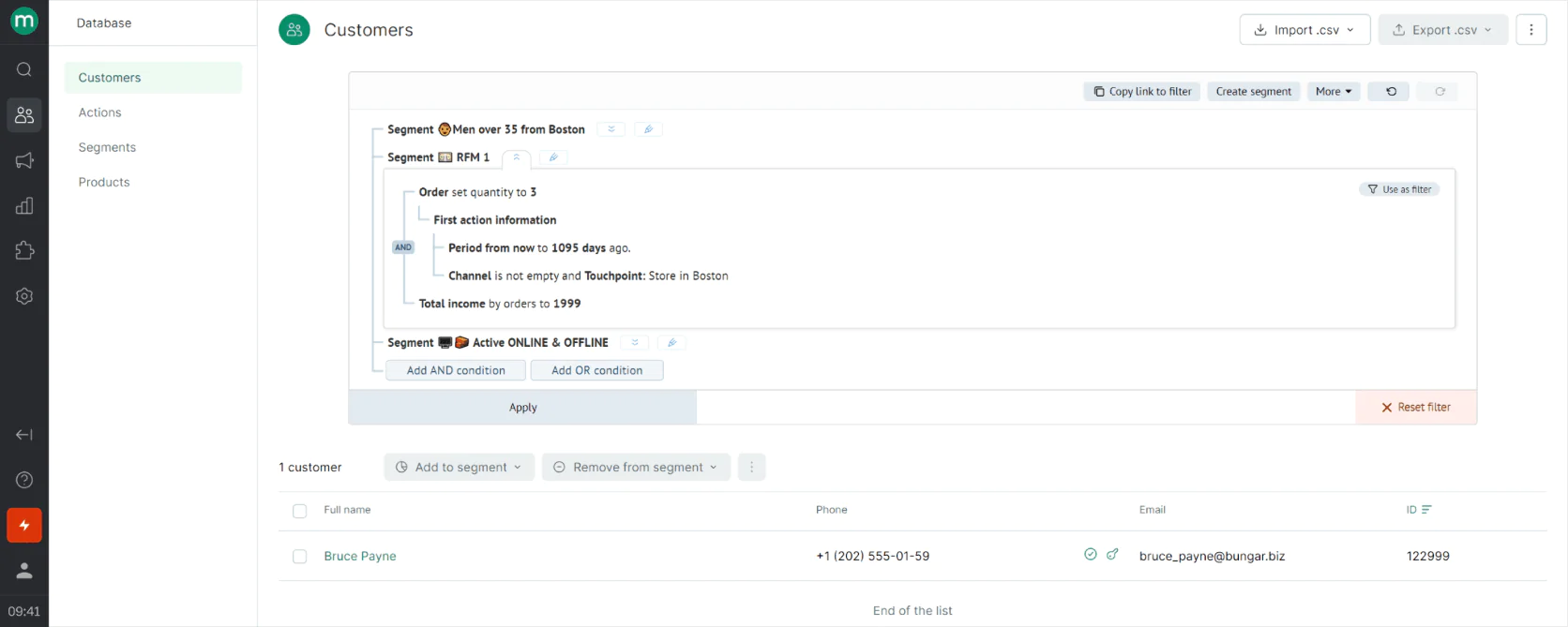
Maestra: user segmentation
Takeaway: All three can do basic to advanced segmentation. Iterable and Maestra are better for large-scale, constantly updating segments (Iterable due to infrastructure, Maestra due to CDP real-time nature). Maestra has more built-in e-commerce-focused segment tools (RFM, product interest) which can save a ton of time and yield more tailored campaigns. If you want plug-and-play segmentation strategies for e-commerce (like automatically finding VIPs or high LTV segments), Maestra is very appealing.
Website and Email Personalization / Recommendations
Iterable: Has the Iterable Catalog feature which can store product data and enable recommendations. Marketers can build content blocks in emails that pull in items dynamically, and even use real-time data like geolocation for relevance. However, Iterable lacks out-of-the-box algorithms for “people who viewed X also view Y”—you’d have to define the logic or integrate an AI tool. Iterable’s strength is that it can work with whatever data you have: if you plug in a recommendation model’s output as fields or use their APIs, you can insert those recs into emails or webhooks to update a site. But compared to a dedicated personalization engine, Iterable is more manual for recommendations.
Customer.io: Does not include a recommendation engine. You can certainly send personalized content if you have the data. For example, you could store each user’s “recommendedProductID” and then include that in an email. But Customer.io won’t calculate that for you. Most Customer.io users rely on their e-commerce platform for related products or use a third-party personalization tool, then use Customer.io purely to deliver the messages. On websites, Customer.io has no widget for product recs; you’d use your eComm site’s functionality.
Maestra: Excels in personalization with AI-driven recommendations. It has a built-in system that analyzes customer behavior and product catalog to suggest items. On the website, Maestra can show personalized content (like “Recommended for you” carousels) in real-time. In emails, it can dynamically insert product suggestions that update up to the moment of open (so inventory or price changes are reflected). Maestra offers 14 prebuilt AI algorithms—e.g., trending items, similar items, frequently bought together, etc.—and also allows custom rules to tweak results.
Use case: A customer browsed running shoes on your site—Maestra can instantly show a “You might also like these running shoes” popup or email block, and if that customer buys, switch to cross-sell recommendations (like socks or insoles) in the next touch. This is Amazon-level personalization without needing separate software.
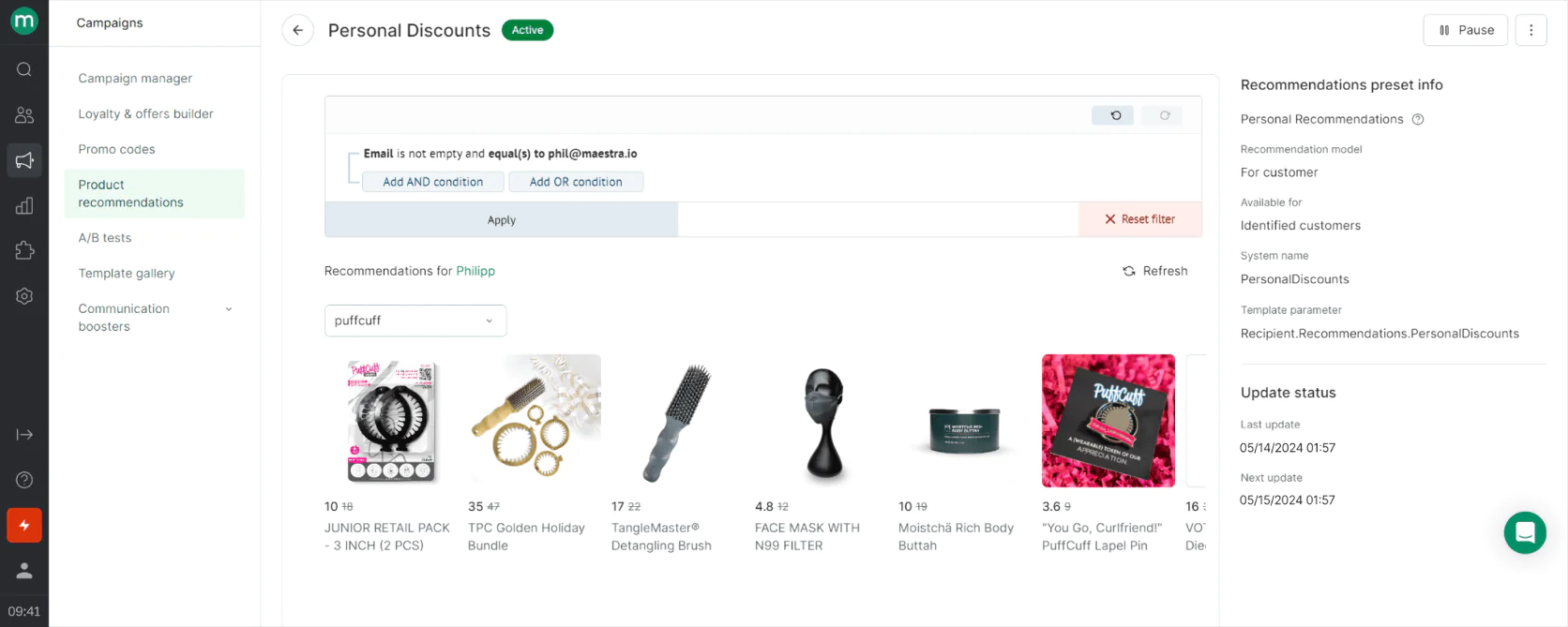
Maestra: сreating a personalized recommendations block
Takeaway: For hands-off, automated product recommendations on site and email, Maestra is far ahead. Iterable can achieve personalization but likely needs your team or other tools to feed it the right data. Customer.io is not focused on on-site personalization at all (it’s mostly off-site messaging). So if you want your marketing platform to also boost on-site conversion with personalized content, Maestra offers that natively.
Ad Audience Management and Optimization
Iterable: Can integrate with ad platforms mainly through its API or partners. Iterable itself doesn’t have a dashboard to manage ads, but you can export or sync audiences to, say, Facebook Custom Audiences (Iterable has documentation on integration with Facebook/Meta). There’s also mention that Iterable can ingest leads from Facebook Lead Ads via Zapier. Iterable focuses more on owned channels, but large companies often use it alongside a Customer Data Platform or tools like LiveRamp for ads. Iterable’s advantage is having up-to-date data to create precise audiences (like all users who added to cart in last 7 days with >$100 cart). However, you might need to manually transfer or set up those syncs.
Customer.io: Ad Audience Sync is a built-in feature. You can turn any segment into an audience in Google Ads, Facebook, Instagram, and even YouTube (via Google) automatically. For example, make a segment of “Lapsed customers” in Customer.io and with a toggle it will upload that list to Google and Facebook continually. This saves time and ensures your ads target the right people without constant CSV uploads. This feature is quite advanced for a mid-market tool and can greatly help in retargeting or exclusion (like suppressing recent buyers from ads). It basically connects your messaging data to your ad campaigns. Customer.io doesn’t optimize bids or creative though; it just automates the audience part.
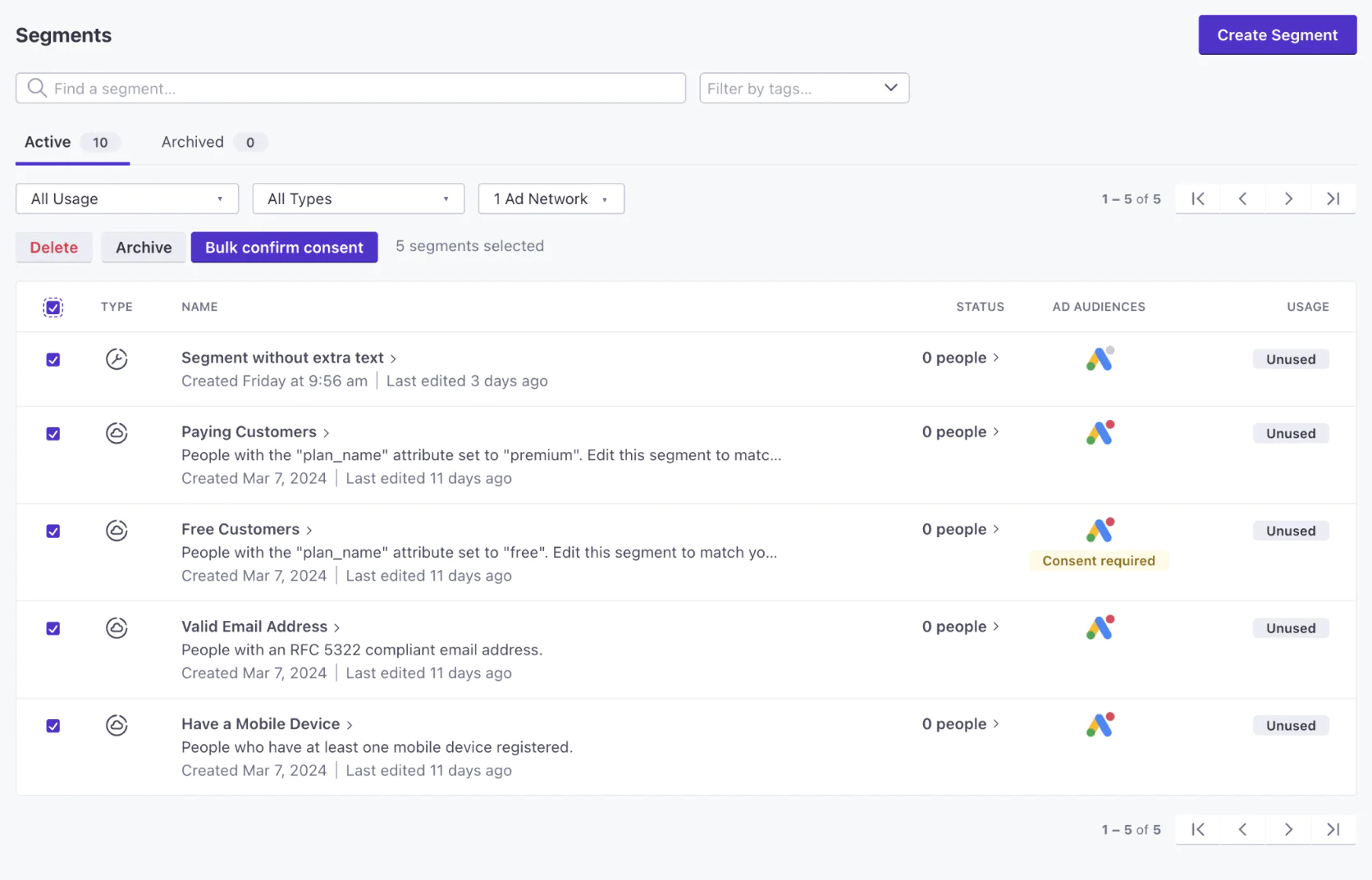
Customer.io’s ad audience management
Maestra: Goes a step further by deeply integrating ad platforms into its omnichannel flows. Maestra can automate audience segmentation for ads in real-time. For instance, when someone completes a purchase, Maestra could automatically remove them from your Facebook prospecting audience and add them to a retention campaign audience on Google. It also supports syncing to Google, Facebook, and Instagram natively (similar to Customer.io).
Additionally, because Maestra has all your customer data, it claims you can have very precise micro-segments (as small as ~1,000 people) for hyper-targeted ads. This might improve ROAS by only spending on the most relevant users.
Maestra even captures leads from social lead forms (Facebook/Instagram lead ads) automatically into its CDP. And while it’s not managing creative, Maestra’s approach reduces wasted ad spend by continually refreshing who should see what ad based on their latest behavior.
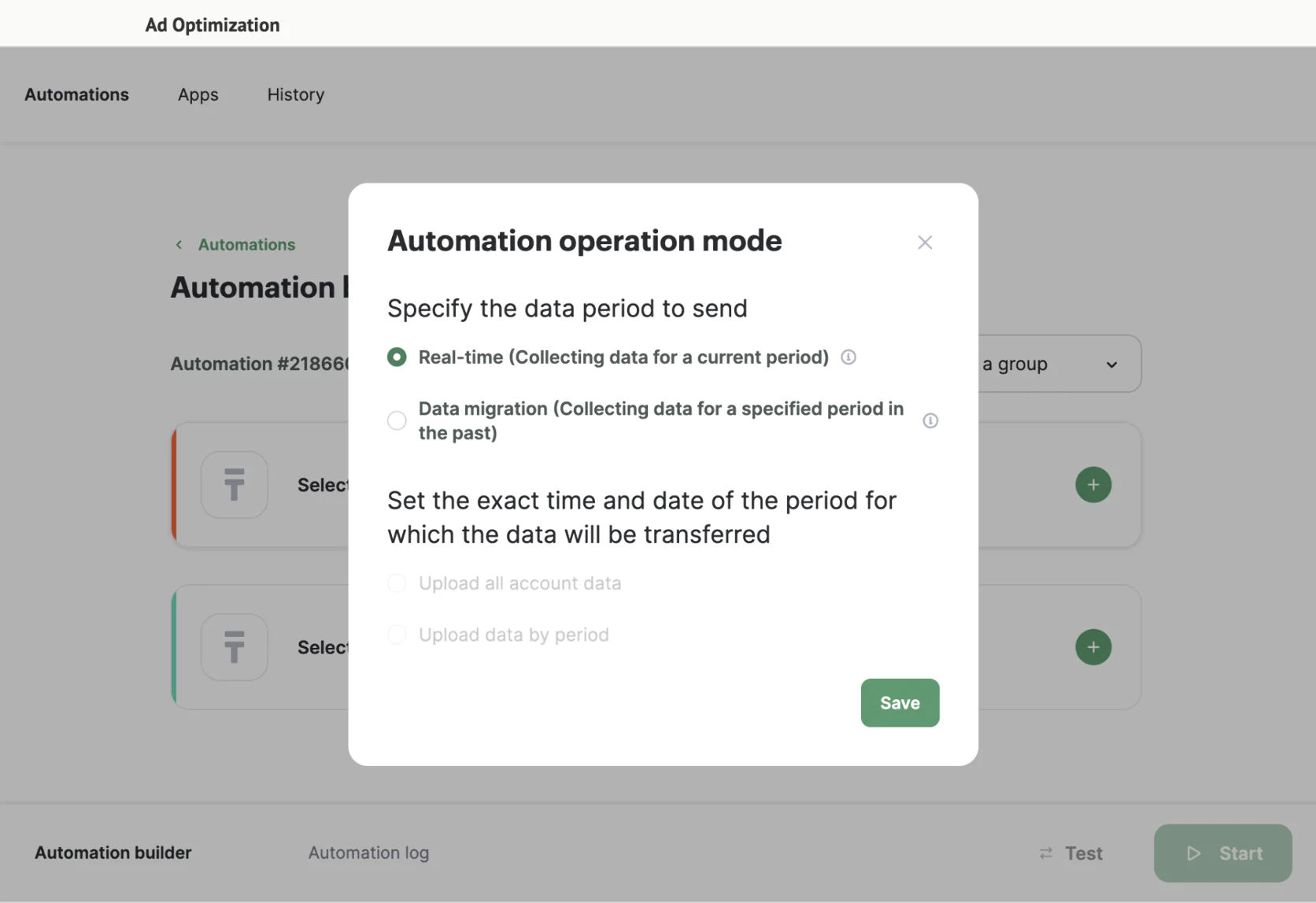
Maestra’s audience automated segmentation for ads in real-time
Takeaway: If you don’t do much with paid ads or handle it separately, all are fine. If you do run a lot of retargeting or lookalike campaigns, Customer.io and Maestra both provide excellent solutions to keep audiences synced and optimized. Maestra has the edge for complex strategies (multi-step flows including ads, and rapid data sync), whereas Customer.io covers the basics very well. Iterable can do much of this, but it may require more custom work; some marketers might use a tool like Zapier or mParticle to link Iterable to ad platforms.
Analytics and Reporting
Iterable: Provides Iterable Insights, a customizable dashboard system. You can track campaign performance, customer cohort behavior over time, and metrics for each channel. Iterable supports A/B and multivariate testing and will show results in the platform. It also has a cohort analysis (like how many users who did X went on to do Y) and journey analytics, which is useful for fine-tuning workflows. If you’re data-savvy, you can export data to a warehouse or connect BI tools via API. Iterable’s reporting strength is giving enterprise-level views (deliverability monitoring, user path analysis, etc.), but small teams might find it more than they need.
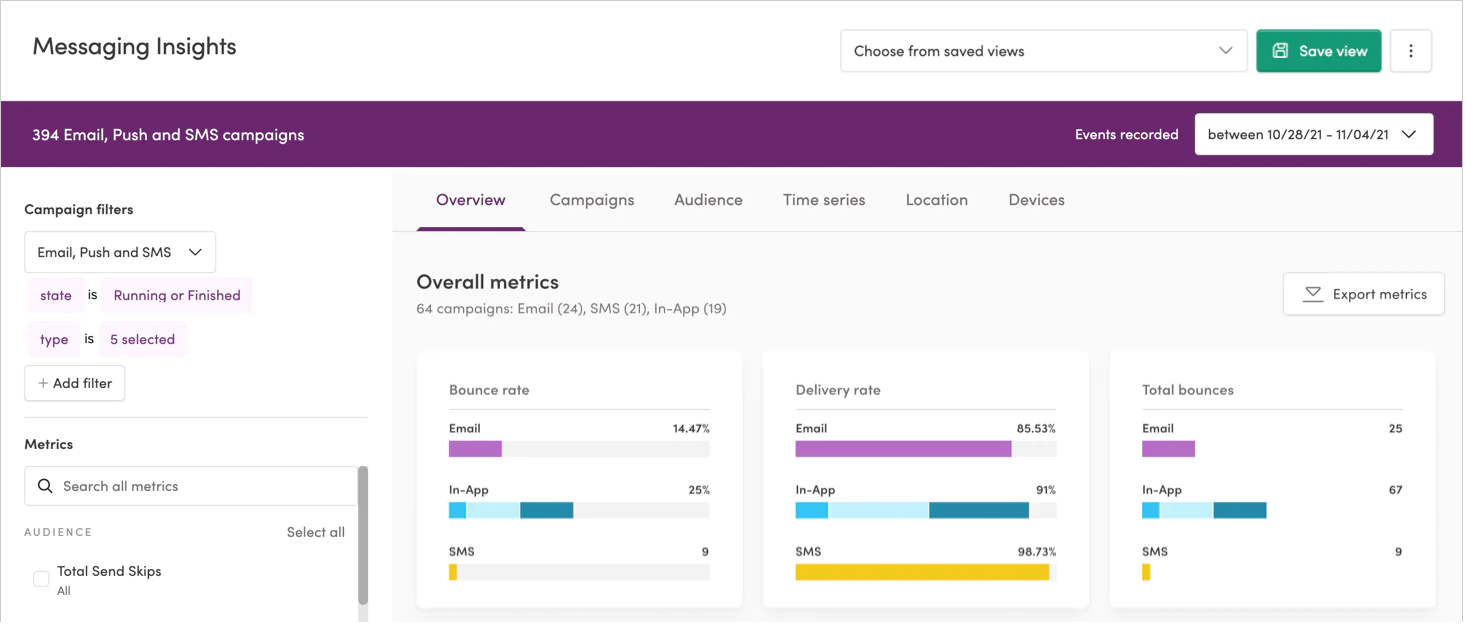
Iterable’s messaging insights
Customer.io: Offers the essentials: open/click rates, conversion tracking (if you set goals), and funnel metrics for campaigns. They have an Analysis section where you can run reports comparing campaigns or viewing overall performance. It’s not as graphical as some, but you can see, for example, all your newsletters and their stats side by side. Customer.io also supports sending data to external analytics (e.g., sending events to Google Analytics or Mixpanel via webhooks). It has pre-built metrics views and the ability to export CSVs for deeper analysis. One nice feature: conversion tracking—you can define what counts as a conversion (purchase, sign-up) and have Customer.io attribute that back to messages. Overall, solid but not flashy analytics.
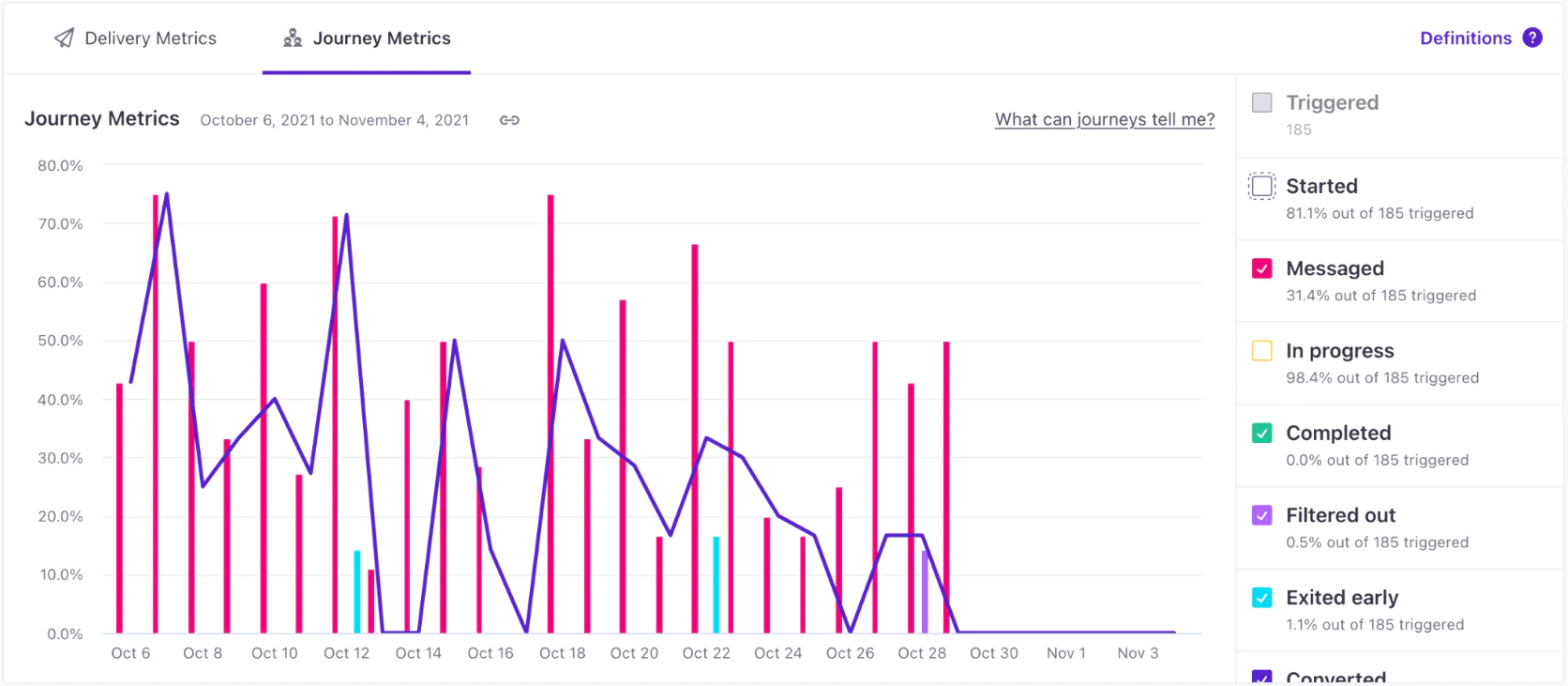
Customer.io: journey metrics dashboard
Maestra: Provides a very comprehensive set of dashboards and reports tailored to e-commerce KPIs. Examples:
- Goals dashboard to track key business goals (orders, revenue) and see how marketing efforts impact them;
- Loyalty dashboard to monitor points issued, redeemed, etc.;
- Campaign performance dashboard tying multi-channel campaigns to sales;
- Subscriber growth stats;
- Email health dashboard that compares your engagement vs. industry benchmarks.
Maestra also emphasizes cost optimization analytics—seeing which discounts or offers yield ROI and which might be hurting margins. Importantly, all data is easily exportable (no extra fee). And Maestra supports robust A/B testing with control groups at the campaign or flow level, showing results on a dedicated A/B report. Essentially, Maestra tries to connect the dots from marketing activity to actual revenue and customer behavior in one place. Given it’s a unified system, you won’t have to jump between, say, an email tool’s analytics and a loyalty tool’s analytics—it’s combined.
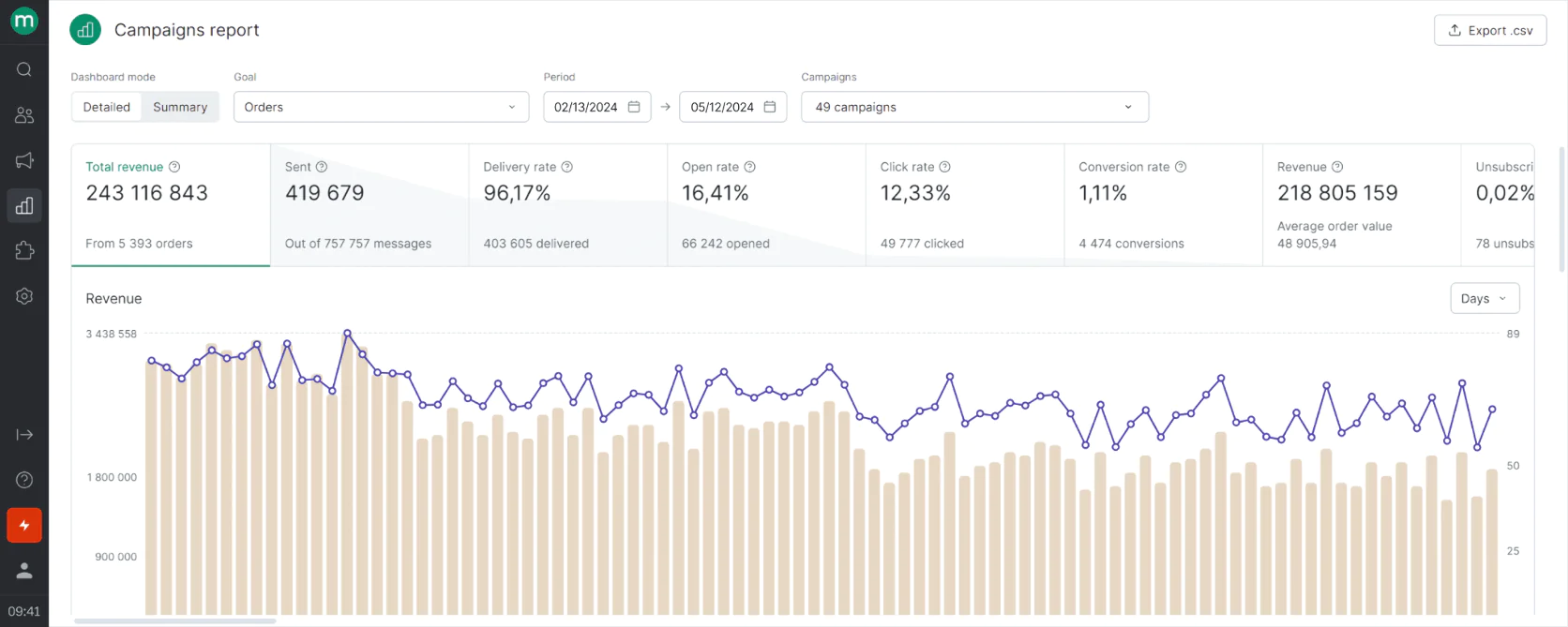
Maestra: campaigns report
Takeaway: Maestra offers the most holistic, e-commerce-specific analytics—beneficial if you want to track things like loyalty ROI or the impact of cross-channel campaigns on sales. Iterable gives very flexible, advanced analytics suited for larger teams who might customize dashboards or do complex journey analyses. Customer.io covers day-to-day metrics well but might require external analysis for big-picture insights.
Customer Support and Service
Iterable: Provides standard support via a ticket system and a comprehensive online help center. Many users on lower tiers get support during business hours, while enterprise clients often have a dedicated customer success manager or support engineer. Quality of Support for Iterable is rated ~8.9/10 on G2, which is excellent. They also have an active community (Iterable Plaza) and lots of documentation/training resources. However, some smaller clients have noted that top-tier support (like very fast responses or strategic guidance) might cost extra or come only with enterprise plans.
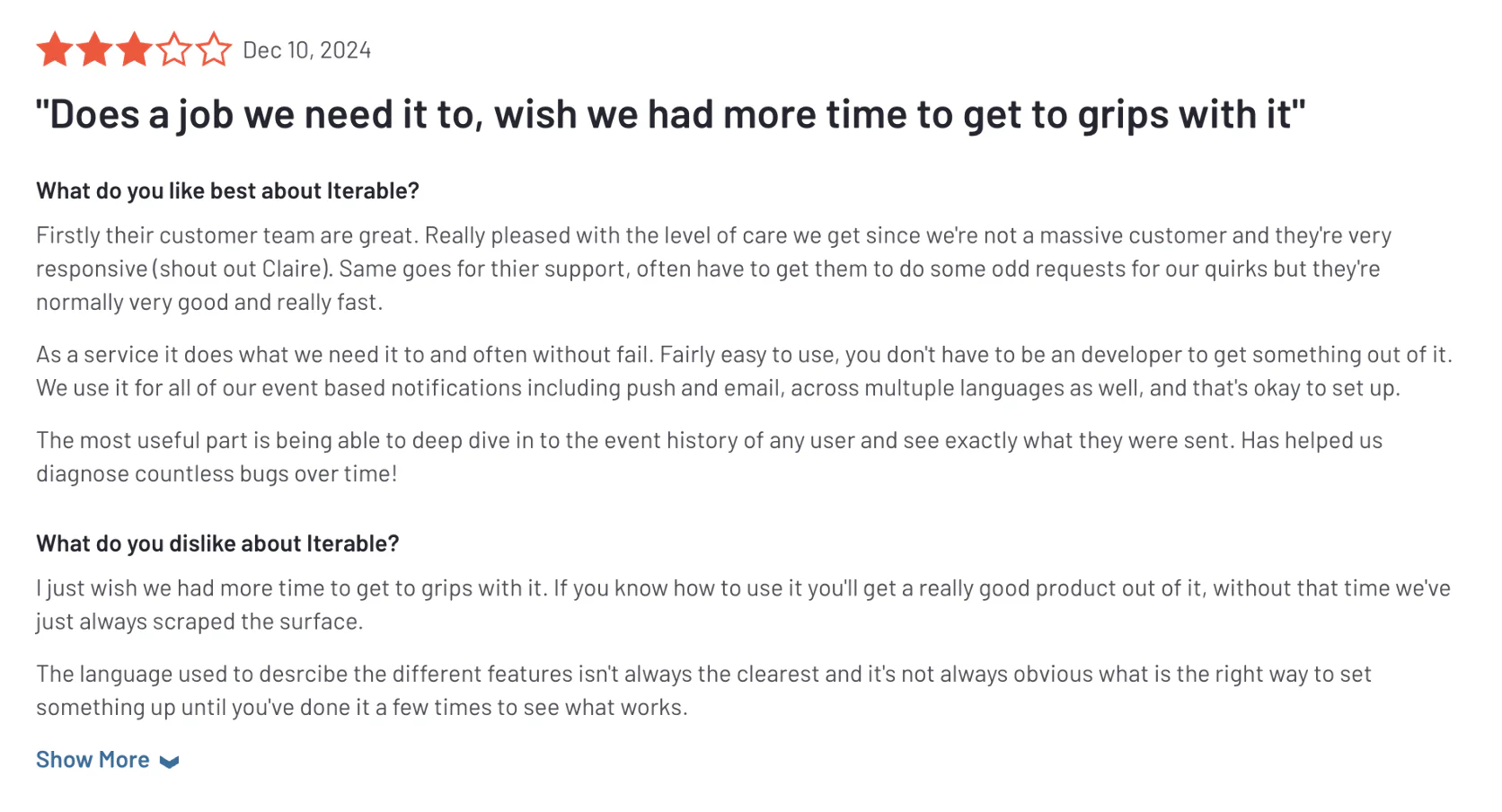
Client’s feedback on Iterable's customer support
Customer.io: All customers get email support within 24 hours guaranteed. On the higher “Premium” plan (~$1k+/mo), you also get chat support and faster responses. Customer.io brags a 99% satisfaction score for support, indicating they’re quite attentive. They also provide onboarding help for new customers (90-day onboarding assistance on Premium). Their online community and docs are solid and geared toward both marketers and developers. Uniquely, because Customer.io often works closely with engineers (for data integration), their support understands technical questions well. Overall, very good support especially for the price point—just note that real-time chat is for higher tiers.

Client’s feedback on Customer.io's customer support
Maestra: White-glove support for all users is a defining feature. From day one, you get a dedicated Customer Success Manager (CSM) who is essentially an extension of your team. They help with everything: initial strategy, migrating data from other systems, setting up campaigns/flows, and even creating custom integrations if needed. Maestra support promises <5 minute live chat responses for any user, which is almost unheard of. They do weekly or bi-weekly check-ins, provide marketing best practice advice, and proactively monitor your account for issues. This level of service ensures you utilize the platform fully. Essentially, with Maestra’s cost, part of what you pay goes toward a very hands-on support experience to drive success.
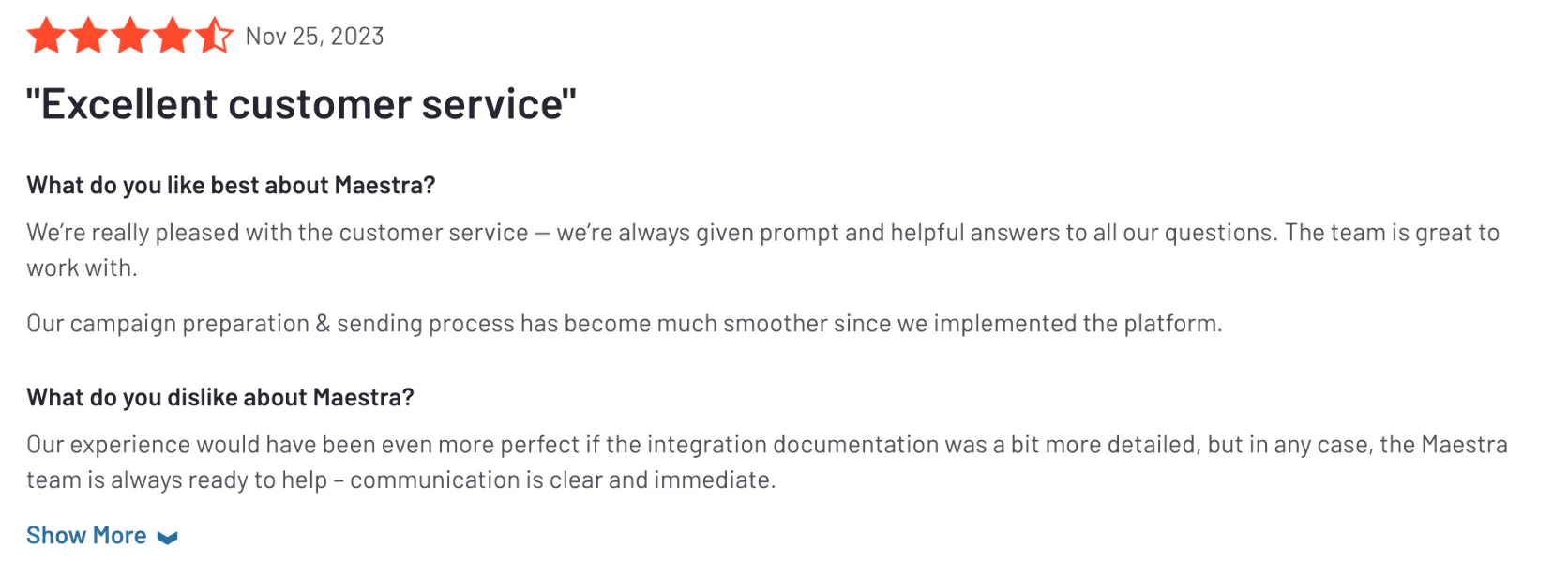
Client’s feedback on Maestra’s customer support
Takeaway: If you value hand-holding and strategic support, Maestra offers the most (fitting its target of mid-market clients who want to accelerate growth). Customer.io gives excellent support for technical onboarding and respectable help for daily use, especially on Premium. Iterable provides good support as well, but often tiered; large enterprise clients get great service, smaller ones may rely more on self-service resources (which Iterable provides abundantly). All three have high marks from users, with Maestra aiming to differentiate by making every client feel enterprise-level supported.
Pricing Structure
Iterable: Enterprise pricing (quote-based). Iterable typically does not publish prices. Reports and reviews indicate it’s on the higher end, often costing tens of thousands per year for mid-sized databases. Iterable’s pricing factors likely include number of contacts, monthly email/SMS volume, and perhaps modules used. Some sources mention extra fees for certain usage: Iterable adds implementation fees and up-charges for API calls, additional attributes, data storage, and events. In short, expect premium pricing and discuss details with Iterable’s sales team. It’s usually justified for companies that will fully utilize its cross-channel capabilities and need that scalability.
Customer.io: Transparent tiered pricing. They have two main plans: Essentials starting at $100/month (billed monthly, no annual contract required), and Premium starting at $1,000/month (billed annually). The price scales with the number of customer profiles and messaging volume. For $100 on Essentials, you get up to 5,000 profiles and ~1 million emails/month included. Premium allows many more profiles (it’s customizable) and adds things like premium support, more custom object types, and HIPAA compliance. SMS messages are typically pay-as-you-go (e.g., $0.006 per SMS in US, roughly). Notably, Customer.io offers a free 14-day trial for anyone to test the platform, which is a low-risk way to see if it meets your needs.
Maestra: Modular pricing based on customer profiles. It starts around $1,990/month for up to 80,000 profiles. While that’s a high entry point relative to Customer.io, that plan includes all core features: CDP, email, SMS (billed by usage ~$0.0045/SMS), loyalty, on-site personalization, recommendations, etc., plus the white-glove support. Maestra prides itself on no hidden fees—unlimited emails are included, and they don’t charge extra for more segments or data points. As your customer list grows, the monthly fee increases, but cost per profile actually decreases at higher tiers (economies of scale). There are no contracts locking you in; they mention “cancel anytime” flexibility.
To put it in perspective: For a small e-commerce brand (say <50k contacts), Customer.io will be the most budget-friendly by far (~$100-200/mo vs. Iterable’s minimum which might be in the thousands, and Maestra’s ~$1,990). For a mid-sized brand (~100k-500k contacts), Customer.io’s cost might grow (perhaps a few hundred to low thousands per month), Iterable will be custom (possibly $5k-$15k+/mo range), and Maestra might be, for example, $2k-$4k/mo depending on profiles count. For larger enterprises, Iterable and Maestra both would be significant investments, but Maestra could be simpler to budget since you’re not also paying for separate loyalty or CDP tools.
Takeaway: Customer.io = best if budget is a primary concern. Iterable = investment for those who need its capabilities at scale—budget for enterprise pricing. Maestra = one-price for all-in-one: email + SMS + CDP + loyalty + personalization separately (and a team to manage them). Always consider the ROI: if a platform drives more revenue by improving marketing, the higher cost pays off.
Ideal User Base (“Best For”) Recap
To wrap up, here’s who benefits most from each platform:
Iterable: Best for mid-market to enterprise e-commerce or retail brands with large customer bases or complex marketing needs. If you have a growth marketing team that wants to leverage advanced AI features, multi-channel journeys, and extensive integrations, Iterable is a top choice. It’s also suited for companies that might have an in-house developer or ops resources to fully connect data sources and perhaps build custom solutions (like loyalty integration). Think of companies that outgrew basic email tools and need something to orchestrate millions of messages across channels while personalizing at scale.
Customer.io: Best for small and medium e-commerce businesses or startups that need affordable, flexible marketing automation. If your focus is on solid email and SMS campaigns, with some push and simple ad retargeting, Customer.io offers great bang for your buck. It’s ideal if you have a lean team—it’s easier to use and you won’t pay for features you don’t need. Also, if you’re very data-driven and maybe already have a data warehouse or are comfortable with APIs, Customer.io lets you pipe that data in and out without limits. Brands early in their journey can start with Customer.io to build robust email/SMS programs and perhaps layer on other specialist tools for loyalty or reviews as needed.
Maestra: Best for mid-market e-commerce brands with established traction (significant traffic and sales) and a desire to consolidate their tech stack. If you have a marketing team that wants to do advanced tactics (loyalty programs, AI recommendations, multi-channel flows) but doesn’t want to manage 5 different tools and vendors, Maestra is a perfect fit. It’s particularly powerful for those aiming for hyper-personalization—the platform handles data and execution together, which can drastically increase campaign effectiveness. Also, if you value service, Maestra will basically join your team to ensure you succeed. However, it might be overkill for very small brands or those with basic needs—it truly shines when you can leverage its full suite across channels.
Iterable vs Customer.io vs Maestra: Pros & Cons
Iterable
Iterable Pros
Iterable Cons
✅ Enterprise-level omnichannel capabilities (email, SMS, push, in-app)
❌ No native loyalty module; requires integrations (e.g., Zinrelo, Talon.One)
✅ AI-driven personalization (send-time optimization, segmentation with AI)
❌ No built-in CDP; can mean extra setup or fees for data unification
✅ Advanced workflows for complex campaigns
❌ Sign-up forms & landing pages only via integrations
✅ Strong analytics and A/B testing
❌ Pricing is quote-based and can get expensive for large sends/data
Customer.io
Customer.io Pros
Customer.io Cons
✅ Email and SMS automation with easy-to-use campaign builder
❌ No built-in loyalty; requires APIs or third-party apps
✅ Data-first approach (unlimited attributes, events)
❌ Limited onsite personalization; mostly off-site channels
✅ Ad audience sync built-in for major ad networks
❌ Push notifications for web require additional setup (mobile SDK or separate provider integration)
✅Transparent tiered pricing
Maestra
Maestra Pros
Maestra Cons
✅ All-in-one platform with built-in CDP
❌ Higher entry price (~$1,990/month for 80k profiles) compared to basic plans elsewhere
✅ Native loyalty, website personalization, AI-driven product recommendations
❌ Best utilized by teams ready to leverage full suite (CDP, loyalty, advanced personalization)
✅ Real-time omnichannel orchestration across email, SMS, web, mobile, ads, and in-store
✅ White-glove support (dedicated success manager, <5 min live chat)
✅ Advanced e-commerce features (RFM scoring, robust segmentation)
Final Verdict: Iterable vs Customer.io vs Maestra
Opt for Iterable if you’re an enterprise-level operation that can handle integrations and values advanced cross-channel messaging, AI features, and a powerful workflow builder.
Try Customer.io if you’re a small or mid-sized business on a tighter budget seeking strong email/SMS automation with solid data handling but fewer native features for loyalty and on-site personalization.
Choose Maestra if you’re a mid-market (or larger) e-commerce brand wanting an all-encompassing solution—CDP, loyalty, robust email/SMS/push, on-site personalization, and ad audience management—backed by dedicated support.
Next Steps
Evaluate your current needs:
- Do you need a simple solution to get campaigns out quickly, or an advanced platform to grow into?
- Are loyalty and on-site personalization on your roadmap soon, or are email and SMS your main focus for the next year?
- How much support do you want—are you DIY or do you want hands-on guidance?
If possible, take advantage of free trials or demos: Customer.io offers a trial, Iterable can demo their enterprise features, and Maestra encourages booking a call to walk through how it can elevate your marketing. Seeing each in action with your scenarios in mind will make the decision clearer.
